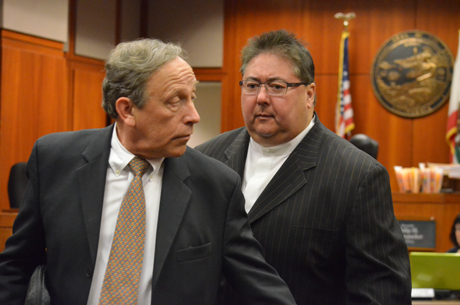George Shirakawa Jr. didn’t attend court for his procedural hearing Friday, disappointing camera crews who were hoping for a shot of the disgraced former county supervisor. And while the brief hearing in Judge Philip Pennypacker’s courtroom didn’t provide much gripping footage for the evening news, it did reveal new details about the fraudulent mailer charges against Shirakawa.
According to database records from the District Attorney’s office, the investigation into the fraudulent mailers came to an end on Feb. 18, 2013, the same day that the DA’s office informed Shirakawa’s attorney John Williams of the DA’s intentions to charge Shirakawa with felony and misdemeanor charges relating to his misuse of campaign and county funds.
“It is the coincidence of those dates that will be the basis of additional discovery requests to the district attorney regarding who was aware of each investigation and when they became aware of it,” Shirakawa defense attorney Jay Rorty said. “Those things happened on the same date and there is nothing in the discovery we can see which indicates why those two incidents coincided.”
Rorty said that discovery requests to be made over the next few weeks will focus on communications within the District Attorney’s office that relate to those two decisions.
Shirakawa ultimately pleaded guilty to 12 charges related to the misuse of campaign and county funds, only to be subsequently charged with false impersonation after his DNA sample—collected when he was arrested for the aforementioned felony charges—was matched to fraudulent mailers sent in 2010. The mailers falsely linked San Jose City Council candidate Magdalena Carrasco to the Vietnamese Communist Party. (Carrasco was the opponent of Shirakawa’s former staffer and current councilman Xavier Campos.)
Prosecutor Karyn Sinunu-Towery told reporters after the hearing that, since Shirakawa was not linked to the mailers until after he’d been arrested and his DNA had been collected, the events of Feb. 18, 2013, were merely a coincidence.
“The first time I learned about the [fraudulent mailer] case and George Shirakawa was when we received a letter from the attorney general after he had pled guilty to the perjury and misappropriation of public funds,” Sinunu-Towery said. “When we got the letter, everyone was dumbfounded.”
Sinunu-Towery said that the investigation into the fraudulent mailer case had actually been formally closed years earlier, and pointed to a news release dated Dec. 14, 2010. According to Sinunu-Towery, an investigator returned a minor file from the Carrasco mailer case on Feb. 18, accounting for the appearance that the case was closed on that date.
“That was like housekeeping,” Sinunu-Towery said. “From 2010, no one had worked on that case. The investigator who had worked on this case kept a file—one little skinny file, not all the evidence—in his office. So, on our database, it showed that it was open. He did zero work on it. He never contacted me about it. I had no information. It wasn’t filed under Shirakawa’s name because Shirakawa wasn’t associated with it.”
Furthermore, Sinunu-Towery said that, had she known about Shirakawa’s connection to the fraudulent mailers, she would have included it as part of the plea bargain. “Why in the world would I approach a prosecution this way?” she asked. ”Why would I strike an agreement for a man to plead guilty when I knew there was something else out there? It makes no sense. There’s no advantage to us for doing that.
“That’s why we put the misappropriation of public funds together with the FPPC violations. It’s to everyone’s advantage to wrap it up at once.”
Adding another layer of complexity to the Shirakawa scandal, his attorney, Williams, was made aware of the charges on Feb. 18. But it wasn’t until March 1, the day he was booked into jail, that Shirakawa announced his resignation.
During that time, Shirakawa took part in closed and open session meetings for the Board of Supervisors. In the closed session meeting, Shirakawa took part in performance evaluations of top county administrators. At the Feb. 24 public meeting, Shirakawa voted on a variety of topics, including immigration reform and multi-million dollar county contracts.
Shirakawa’s defense team plans to file a motion to dismiss the fraudulent mailer charges on Aug. 16. A court hearing is set for Sept. 13 at 3pm to determine whether witnesses will be called with regards to those charges, with a more extensive hearing scheduled for Sept. 20. Sentencing for the twelve charges for which Shirakawa has already pled guilty will follow the conclusion of the fraudulent mailer case.


So DNA evidence is conclusive and indisputable in our Courts, UNLESS you have a couple of high powered attorneys (paid for by friends that appreciate your confidence), in which case you get a Get Out Of Jail Free card. Does this apparent Immunity they’re claiming apply to George’s behavior and actions for the rest of his miserable life, or just until his wealthy benefactors close their checkbooks?
Now that Ms. Sinunu-Towery has announced her retirement, will she really devote her full energy into getting an additional and separate conviction for the Carrasco felony? Or will she quietly let it go? I hope not – George should be held responsible, under the law, for ALL his actions and behavior.
If they throw out the old plea deal, then could Shirakawa argue that his resignation is no longer valid? That’s what I’m rooting for.